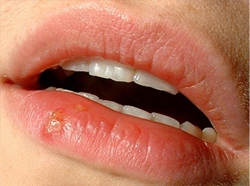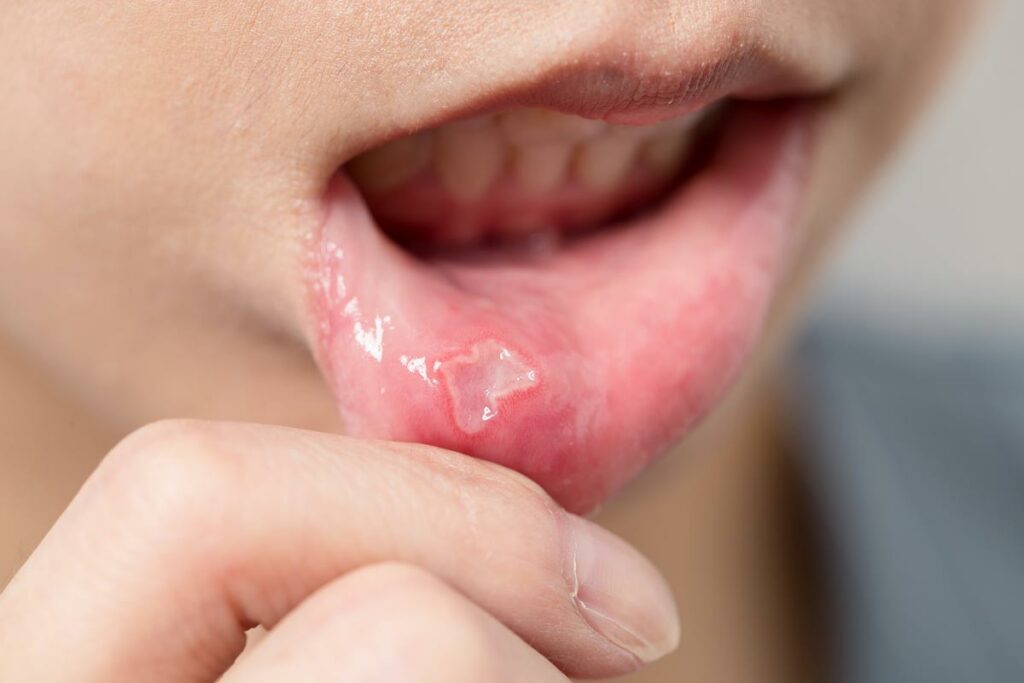Our oral cavity is at increased risk from bacteria, as direct contact with the outside world brings a lot of germs into our bodies every day, which a healthy immune system can cope with.
However, there are times when our immune system weakens following an illness, a viral infection or just a change of season, and many people can find that their mouths develop small ulcers.
Let’s look at the most common lesions affecting the oral mucosa and gums.
AZ AFTA (aphta)
Aphthae, a yellowish-white epithelial defect on the mucous membrane of the oral cavity, surrounded by an inflammatory yard. The painful inflammation in people with about. affects 60% of people in their lifetime and is a recurrent problem in the majority of cases. The lesion can be extremely painful, making it difficult to eat and drink, and sometimes even to speak.
Causes of its development:
There are several hypotheses about its origin, although the exact cause of its formation is still unknown. Viral origin, immunological problems causing weakening of the host, stressful lifestyle, hormonal effects, deficiencies of iron, folic acid, vitamin B12, damage to the oral mucosa, certain foods, are all pathogens.
Treatment:
It is a harmless lesion that usually heals in a few days without treatment. As a local (topical) therapy, it is important to maintain good oral hygiene, and mouthwashes with antiseptic properties can be beneficial. You can now speed up the healing process with laser disinfection treatment. It is important to strengthen the immune system by eating a varied diet and vitamin-rich vegetables and fruits. As much as possible, try to lead a relaxed lifestyle with as little physical and psychological stress as possible.
AJAKHERPESZ (Herpes labialis)

(image source : www.medicaldaily.com)
It is caused by the Herpes Simplex Virus (HSV-1). Nearly 90% of the population carry the herpes virus, but only 1% develop lip or mouth infections.
It first appears as a small blister, which may be preceded by a burning, itching sensation in the area. Then the blister develops into a red-edged ulcer. Accompanying symptoms include painful lymph node swelling, a prostrate state, fever, and increased saliva production.
The lesion heals in 1-2 weeks without scarring, but can often recur in the same place. You can promote healing with increased oral care and an antiviral brush.
As herpes is contagious, we must take extra care not to pass on the infection while the disease is present to protect those around us. Avoid kissing, kissing, sharing glasses and cutlery. Take special care to clean, disinfect and wash your cutlery and glasses.
NECK DISEASE (Stomatitis)
Inflammation of the oral mucosa is most often caused by viral infections, but bacterial or fungal infections are not uncommon, as well as inflammation caused by various medications (e.g. salicylates, antibiotics, long-term use of contraceptives), chemicals (e.g. arsenic, fluoride, chlorine). Poor oral hygiene, bad teeth and poor dental health can predispose you to viral infections.
The ulcer mainly develops on the mucous membrane of the cheek and is covered with greyish plaque, and also often includes fever, swelling of the lymph nodes, profuse, purulent saliva, and taste disturbance.
Candida albicans is the most common fungus that multiplies in the oral cavity. Prolonged use of antibiotics, corticosteroids, radiotherapy and chemotherapy, a weakened immune system and wearing plastic dentures can predispose you to fungal infections.
Particular attention should be paid to the cleaning of dentures, because if a fungal infection develops on the oral mucosa, the denture can no longer be worn.
The reason is that the fungus that has grown in the pores of the acrylic sheet cannot be removed, which means that the denture would “re-infect” the oral cavity after healing. So it’s important to clean your dentures as a preventative measure, and if an infection has developed, you should have a new denture made.

